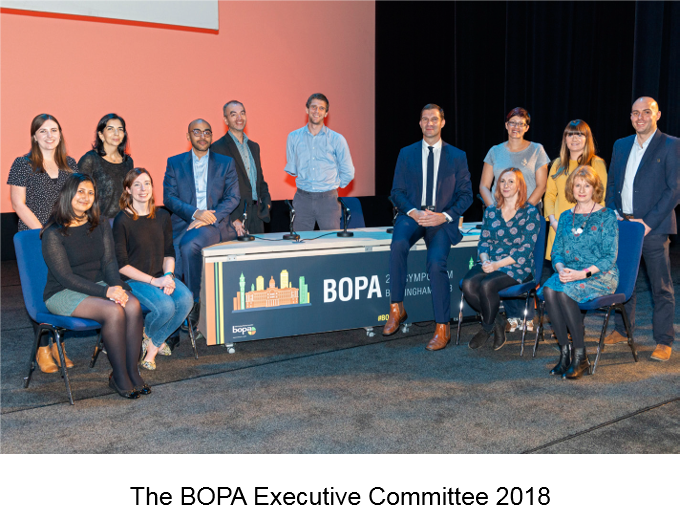By Emma Foreman, Symposium Lead - BOPA Executive Committee
The 21st British Oncology Pharmacy Association (BOPA) annual symposium took place this year at the ICC Birmingham, with an exciting and thought-provoking agenda, and the chance to attend a variety of sessions including pre-conference workshops, industry-led satellites, breakout sessions, exhibitions, and, of course, plenary sessions from the top experts in the field of oncology. As in previous years, talks were fully interactive. Delegates were provided with remote keypads to answer speaker questions and had the opportunity to discuss their novel research during the poster presentations and debate sessions.
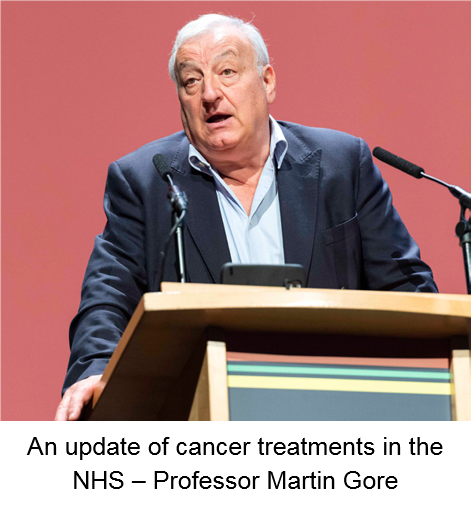 The opening plenary session at this year’s symposium was given by Professor Martin Gore, a highly esteemed medical oncologist based at The Royal Marsden Hospital and Institute of Cancer Research. Professor Gore gave an informative talk on the strategies used to improve cancer treatments in the NHS. In 2015, the Cancer Taskforce outlined a comprehensive 5 year strategy for England with the view to transforming cancer care by ensuring an early diagnosis, fast-track access to new cancer drugs, and improving quality of life for those living with and beyond cancer. Working together in Cancer Alliances, clinicians and leaders in healthcare can pinpoint areas for local improvement by redesigning pathways and delivering changes in clinical behaviour.
The opening plenary session at this year’s symposium was given by Professor Martin Gore, a highly esteemed medical oncologist based at The Royal Marsden Hospital and Institute of Cancer Research. Professor Gore gave an informative talk on the strategies used to improve cancer treatments in the NHS. In 2015, the Cancer Taskforce outlined a comprehensive 5 year strategy for England with the view to transforming cancer care by ensuring an early diagnosis, fast-track access to new cancer drugs, and improving quality of life for those living with and beyond cancer. Working together in Cancer Alliances, clinicians and leaders in healthcare can pinpoint areas for local improvement by redesigning pathways and delivering changes in clinical behaviour.
Professor Gore emphasised how important research and innovation are to improve cancer care and encouraged us all to get involved, pointing out that research is not all about big clinical trials but can be used to evaluate the best way to deliver a service. He told the audience ‘Don’t spend your Saturday reading someone else’s research – write your own!’
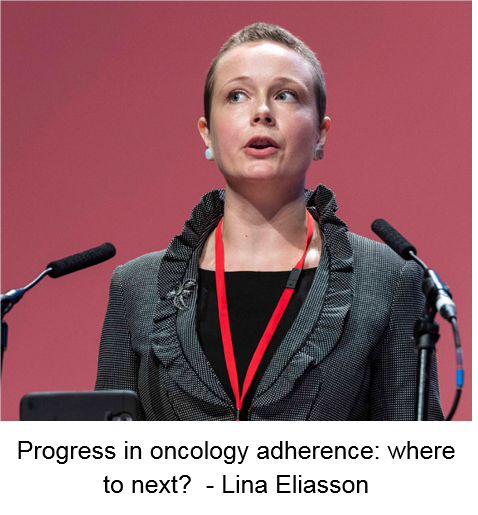 The importance of evidence-based practice was also reflected in another plenary ‘Progress in oncology adherence: where to next?’ presented by Lina Eliasson, Founding Director of Sprout Behaviour Change. Lina told the audience that non-adherence to oral medication regimens is common and can have a negative impact on treatment response. There are a multitude of factors associated with low adherence, including patient factors, disease factors, treatment factors and provider and healthcare system factors. Interventions that can improve this include educational support, treatment monitoring, pharmacy-based programmes and counselling programmes.
The importance of evidence-based practice was also reflected in another plenary ‘Progress in oncology adherence: where to next?’ presented by Lina Eliasson, Founding Director of Sprout Behaviour Change. Lina told the audience that non-adherence to oral medication regimens is common and can have a negative impact on treatment response. There are a multitude of factors associated with low adherence, including patient factors, disease factors, treatment factors and provider and healthcare system factors. Interventions that can improve this include educational support, treatment monitoring, pharmacy-based programmes and counselling programmes.
However, to date, interventions have had limited success, and it is not clear which are the most effective. Lina described a systematic review by Greer et al which found just 12 interventions to improve adherence to oral anticancer medicines of which only 3 demonstrated actual impact – more research is needed in this area. She introduced the audience to the EPIC project (Empowering Pharmacists to Improve healthcare for oral Chemotherapy patients). This project directly targets pharmacists involved in dispensing oral chemotherapy and aims to emphasise the importance of education and adherence, with the ultimate aim of improving practice in different countries.
The use of technology was a strong theme throughout the symposium, and how it could be used to improve patient experience or to reduce workload, releasing time for pharmacists to spend on more innovative, patient facing services. Professor Rob Duncombe from The Christie NHS Foundation Trust went head to head with Bruce Burnett from the University of Central Lancashire for the BOPA 2018 debate: ‘Prescription screening by AI – can we really be replaced by robots?
 |
This light hearted debate had a serious message about the clinical impact that the use of AI may have for pharmacists, and the value that it could bring in terms of patient care, as well as highlighting some of the potential long- and short-term negative outcomes.
“If you’ve got a mess and you automate it, you’ve still got a mess” argued Bruce, presenting the case against the use of AI in prescription screening. He referred to the BOPA standards on prescription verification, which highlight the requirement for judgment and understanding. Bruce argued that although AI may be able to process data efficiently and quickly and avoid human error, some of the requirements needed for prescription screening purposes may include elements that it is not yet capable of.
Professor Duncombe presented the case supporting the use of AI in prescription screening. He began his counter argument by emphasising that technological developments need to be embraced and be utilised to help with the smooth running of day-to-day processes in the workplace, such as prescription screening. Professor Duncombe argued that the world is evolving rapidly, and electronic systems are beginning to become the norm; in this contest, not only will AI make processes faster but it will also save a huge amount of money for the healthcare system.
The audience cast their votes, and Prof. Duncombe was declared the winner. In his closing statement, session chair Jatinder Harchowal shared a quote from a radiology colleague who said ‘AI will not replace radiologists, but radiologists who use AI will replace the ones who don’t.’
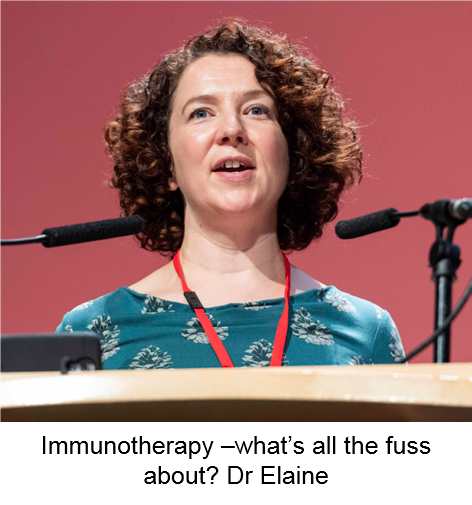 As usual, the conference provided a variety of clinical updates in different tumour sites including triple negative breast cancer, lung, bladder, ALL and myeloma but this year they were accompanied by sessions on associated specialties such as thrombosis, cardio-oncology and the rheumatologic side effects of immune-oncology treatments which are coming to the forefront as the use of targeted treatments and immunotherapy increases.
As usual, the conference provided a variety of clinical updates in different tumour sites including triple negative breast cancer, lung, bladder, ALL and myeloma but this year they were accompanied by sessions on associated specialties such as thrombosis, cardio-oncology and the rheumatologic side effects of immune-oncology treatments which are coming to the forefront as the use of targeted treatments and immunotherapy increases.
One of the most popular sessions of the conference was a presentation by Dr Elaine Vickers entitled ‘Immunotherapy – what is the fuss all about?’ in which she explained of the different ways that the immune system can be used to target tumours. Elaine is renowned for her ability to make complex subjects easy to understand, and her talk explored antibody based, cell based and vaccine based therapies including CAR-T cells which were another hot topic throughout the weekend.
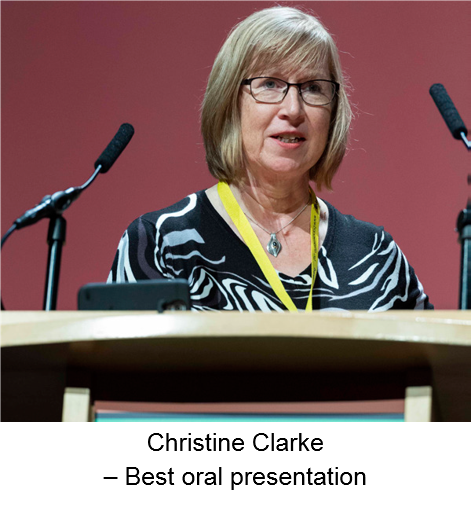 BOPA chair, Steve Williamson closed the conference and announced the winners of the poster and oral presentation prize winners. This year, there were three poster winners:
BOPA chair, Steve Williamson closed the conference and announced the winners of the poster and oral presentation prize winners. This year, there were three poster winners:
1) Calum Polwart, County Durham & Darlington NHS Foundation Trust, ‘Optimising the introduction of new cancer medicines across multiple National Health Service (NHS) hospitals within a single prescribing network’;
2) Seonaid McLachlan, West of Scotland Cancer Network, ‘Building a sustainable non-medical prescriber (NMP) workforce to enable the delivery of systemic anti-cancer therapy (SACT) in the West of Scotland Cancer Network (WoSCAN)’;
3) Shereen Nabhani-Gebara, Kingston University, ‘Perceptions of oncology pharmacists about their visibility to patients’.
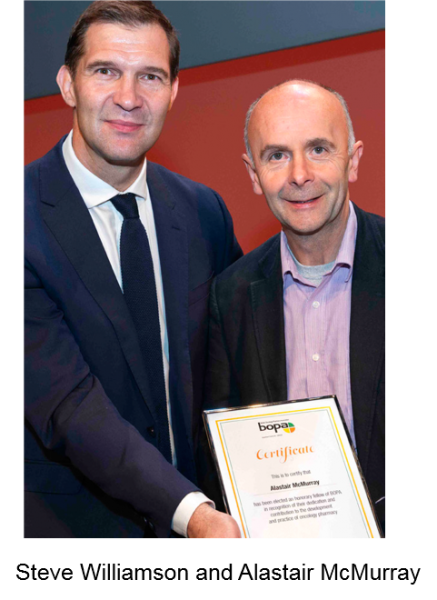 The winner for the best oral presentation was awarded to Christine Clarke, for her practice-changing work on the ‘Development of a dynamic ‘dashboard for SACT data’. Christine was awarded a bursary of £2,000 which will cover travel fees for her to attend and present at an international conference.
The winner for the best oral presentation was awarded to Christine Clarke, for her practice-changing work on the ‘Development of a dynamic ‘dashboard for SACT data’. Christine was awarded a bursary of £2,000 which will cover travel fees for her to attend and present at an international conference.
The BOPA Fellowship was awarded to Alastair McMurray, for his long-standing contribution to BOPA and the oncology pharmacy profession as a whole.
Next year, BOPA will be hosting the ISOPP 2019 symposium and the committee are looking forward to welcoming our international colleagues to London for another excellent programme of educational sessions and networking opportunities. See you there!
